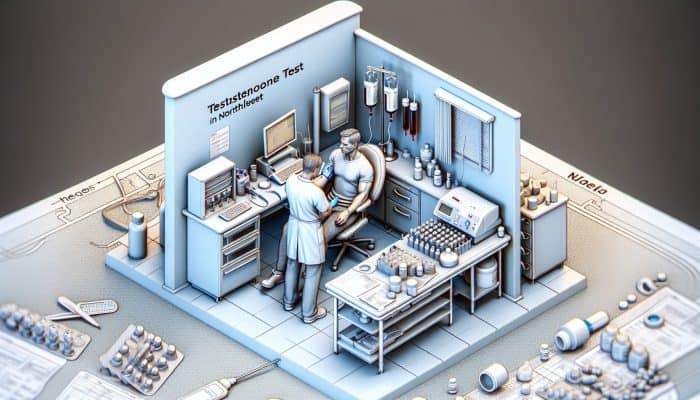Maximize Your Health Insights with a Comprehensive Testosterone Blood Test
Discover the Vital Role of a Testosterone Blood Test

A testosterone blood test in Northfleet serves as an essential diagnostic tool that measures the levels of testosterone, a critical hormone that plays a pivotal role in various physiological processes. This hormone is crucial for fostering muscle mass growth, maintaining bone density, and regulating libido. By evaluating testosterone levels, healthcare providers can identify several health issues that may arise from hormonal imbalances, making this test a foundational component in assessing male health and enhancing overall wellness.
Understanding the complexities of this blood test is vital, as it equips healthcare professionals to detect both low and high testosterone levels, which may indicate serious medical conditions. Elevated testosterone levels might point to various health concerns, emphasizing the importance of monitoring hormonal variations to develop effective treatment strategies tailored to individual health needs and situations.
Understanding the Key Functions of the Testosterone Blood Test
The foremost aim of a testosterone blood test in Northfleet is to assess and oversee hormonal health. This assessment is particularly advantageous for diagnosing conditions such as hypogonadism, a disorder characterized by the body's insufficient production of testosterone. Symptoms associated with this condition may include a reduced libido, persistent fatigue, and diminished bone density, all of which can severely impact an individual’s quality of life.
Moreover, this diagnostic procedure is critical for investigating infertility issues and specific sexual dysfunctions. Men facing fatigue or notable mood swings may find that their testosterone levels are contributing to these challenges. By gaining insight into their testosterone levels, individuals can explore targeted treatment options, which may include lifestyle modifications, hormone replacement therapy, or further investigations into other health issues affecting their hormonal balance.
Your Step-by-Step Guide to the Testosterone Blood Test Procedure
Participating in a testosterone blood test in Northfleet is a seamless and straightforward process. It typically begins with a qualified healthcare professional collecting a blood sample from a vein in your arm. This procedure takes place in a sterile clinical environment, ensuring safety and precision, which are critical for achieving reliable test results.
After the blood sample is obtained, it is sent to a laboratory for comprehensive analysis. The testing methods utilized are efficient and encompass various techniques for measuring testosterone levels, including assessments of both total testosterone and free testosterone. Identifying the most suitable test for your health evaluation is crucial, and healthcare providers usually offer guidance based on individual health histories and requirements.
Effective Strategies for Preparing for Accurate Testosterone Test Results

Proper preparation is vital to ensuring you achieve accurate results from a testosterone blood test in Northfleet. Patients are typically instructed to refrain from consuming any food or beverages, except for water, for a specified duration prior to the test. Adhering to these guidelines is crucial, as it ensures that the test results accurately reflect your hormone levels, free from any interference caused by recent dietary intake.
Factors such as stress, illness, or even physical exertion can skew results, underscoring the importance of following preparatory instructions closely. Being thoroughly prepared not only establishes a reliable baseline for testosterone levels but also aids in the correct identification of any potential health issues that may warrant medical attention and intervention.
Confidently Interpreting Your Testosterone Test Results
Interpreting the findings from a testosterone blood test in Northfleet requires a comprehensive understanding of what constitutes normal hormonal ranges, which can vary significantly based on age and sex. Healthcare professionals will compare the reported values against these established reference ranges to accurately evaluate your hormonal health.
Abnormal testosterone levels, whether too high or too low, often necessitate further evaluation. Low testosterone levels may point to underlying health conditions that require treatment, while high levels might prompt additional testing to rule out serious health issues. Engaging in an informed discussion with your healthcare provider post-test is essential for understanding the implications of these results for your overall health and future treatment options.
Explore Why Northfleet is the Premier Destination for Testosterone Testing
Access Expert Healthcare Services Tailored to Your Needs

Choosing Northfleet for your testosterone blood test means gaining access to healthcare services enriched by local expertise. The healthcare professionals in this region not only possess the technical proficiency required to conduct the test but also the essential knowledge to interpret the results comprehensively. Their familiarity with prevalent health conditions within the community allows them to provide relevant advice and personalized treatment plans that resonate with local residents.
Additionally, many practitioners in Northfleet specialize in men's health, enhancing their capability to address sensitive issues related to testosterone levels and overall wellness. This focused approach cultivates an environment where individuals feel comfortable discussing their health concerns, ensuring a holistic and supportive healthcare experience.
Convenient Access to Testing Facilities Across Northfleet
Convenience is a key component of healthcare accessibility, and Northfleet boasts a wide range of clinics and laboratories that facilitate easy access to testosterone blood tests. With numerous facilities available in the area, residents can locate nearby clinics easily, removing barriers that may discourage individuals from seeking essential health assessments.
These local clinics often employ advanced technology and skilled personnel, ensuring that patients receive prompt, high-quality services. The ease of access enables quicker appointment scheduling, minimizing disruptions to daily life and allowing individuals to prioritize their health without the need for extensive travel or prolonged waiting periods.
Cost-Effective Testing Solutions Available in Northfleet
Selecting Northfleet for your testosterone blood test can be a financially savvy choice. The testing costs in this region are frequently more competitive compared to those in larger metropolitan areas, making it an attractive option for individuals who are budget-conscious regarding healthcare expenses.
Furthermore, many clinics in Northfleet accept a wide variety of health insurance plans, which can further reduce out-of-pocket expenses. Understanding these financial factors can alleviate concerns related to the affordability of necessary health evaluations, thereby making proactive health management more accessible for local residents.
Comprehensive Preparation for Your Testosterone Blood Test
Clarifying Fasting Guidelines for Optimal Health Assessment
Preparing for a testosterone blood test in Northfleet often involves adhering to specific fasting guidelines. Healthcare providers may suggest that patients avoid eating or drinking anything other than water for a set period before the test. Following this fasting protocol is crucial to ensuring that results are accurate and not influenced by recent dietary choices.
Typically, the fasting duration spans from 8 to 12 hours, depending on the specific advice provided by your healthcare provider. Observing these recommendations is essential as it helps to present a clearer picture of your testosterone levels, ultimately leading to more precise diagnoses and informed treatment recommendations.
Disclosing Medication Use Prior to Testing
When preparing for a testosterone blood test in Northfleet, it is imperative to inform your healthcare provider about any medications you are currently taking. Certain medications can significantly affect testosterone levels, and your doctor might advise temporarily discontinuing specific drugs before testing to avoid skewed results.
For instance, medications related to hormone therapy, anabolic steroids, or even some antidepressants can impact hormonal balance. Open dialogue regarding your medication history allows your healthcare provider to navigate you effectively through the preparation process, ensuring that your test results accurately reflect your health status and any treatment needs that may arise.
Optimal Timing for Accurate Testosterone Testing
The timing of your testosterone blood test in Northfleet can significantly affect the accuracy of the results. Testosterone levels naturally fluctuate throughout the day, often peaking in the early morning. Thus, healthcare providers often suggest scheduling tests for the morning hours to obtain the most reliable results.
Aligning the test timing with these natural hormonal cycles increases the likelihood of achieving accurate testosterone measurements. This understanding aids healthcare professionals in making informed diagnoses and suggesting potential treatment options tailored to your unique hormonal profile.
Addressing Lifestyle Factors Leading Up to the Test
Various lifestyle factors can greatly impact the results of a testosterone blood test in Northfleet. Activities such as engaging in intense workouts, consuming alcohol, or experiencing elevated stress levels right before the test can alter testosterone concentrations. Therefore, it’s advisable to avoid vigorous physical activity and restrict alcohol intake in the days leading up to the test.
Additionally, ensuring adequate rest and effectively managing stress levels can contribute to more stable hormone levels, thereby promoting a more accurate assessment. These lifestyle changes not only improve the reliability of your test results but also promote better overall health and well-being in the long run.
What to Expect During Your Testosterone Blood Test
A Detailed Overview of the Blood Testing Procedure
Undergoing a testosterone blood test in Northfleet is typically a brief and uncomplicated experience. The blood draw is conducted by a qualified phlebotomist who will prepare the site, usually on the arm, for the collection process. This procedure is swift, often taking no more than a few minutes from start to finish, ensuring minimal disruption to your daily routine.
Patients generally report only mild discomfort related to the blood draw, which may feel akin to a slight pinch. Understanding that this process is quick and straightforward can help alleviate any anxiety associated with the test, allowing individuals to focus on the importance of the assessment rather than any transient sensations experienced during the blood collection.
Managing Discomfort During the Blood Draw
While the prospect of a testosterone blood test in Northfleet may cause some anxiety, it’s important to recognize that any potential discomfort is usually minimal and short-lived. Patients might feel a slight sting when the needle enters the skin, followed by a sensation of pressure as blood is drawn.
For most individuals, this discomfort subsides almost immediately after the needle is withdrawn. Being informed about what to expect can significantly reduce anxiety, enabling patients to concentrate on the significance of the test rather than the brief sensations associated with the blood draw.
Post-Test Activities and Important Considerations
After the blood sample has been collected during your testosterone blood test in Northfleet, you are free to return to your usual activities immediately. Typically, there are no major restrictions or recovery protocols following the test, making it an efficient part of your healthcare routine.
The collected sample will be sent to a laboratory for detailed analysis, where it will undergo careful examination to accurately measure testosterone levels. Recognizing that this procedure is straightforward can help ease any pre-test nerves, allowing you to focus on the subsequent steps in your healthcare journey with clarity and purpose.
Understanding the Timeline for Receiving Your Results
After your testosterone blood test in Northfleet, patients generally receive their results within a few days to a week, depending on the laboratory's processing efficiency. This relatively swift turnaround allows for timely discussions with healthcare providers regarding the interpretation of results and necessary subsequent steps.
Receiving results quickly can provide peace of mind, enabling individuals to promptly address any concerns about their hormonal health. It also sets the stage for potential next steps, whether that involves treatment strategies, further testing, or lifestyle adjustments based on the findings.
Decoding Your Testosterone Test Results
Understanding Normal Testosterone Levels
Comprehending what constitutes normal testosterone levels is essential when interpreting the results of a testosterone blood test in Northfleet. These normal ranges can differ significantly based on factors such as age, sex, and individual health conditions. Generally, laboratories provide reference ranges, allowing healthcare providers to evaluate whether your testosterone levels are within a healthy spectrum.
For men, typical total testosterone levels generally range from approximately 300 to 1,000 ng/dL (nanograms per decilitre), though variability exists. Knowing where your levels fall within these ranges can yield valuable insights into your hormonal health and facilitate discussions about potential lifestyle changes or medical interventions necessary to optimize your well-being.
Identifying Low Testosterone Levels and Their Implications
When your testosterone blood test in Northfleet reveals low testosterone levels, it may suggest conditions such as hypogonadism or other hormonal imbalances. Low testosterone can present through various symptoms, including enduring fatigue, mood disorders, decreased sexual desire, and even osteoporosis in more severe cases.
If results indicate low testosterone, your healthcare provider will typically discuss various treatment options, which may include hormone replacement therapy, lifestyle changes, or further diagnostic evaluations to uncover underlying causes. Understanding the consequences of low testosterone levels is crucial for paving the way to effective management and improving quality of life.
Understanding the Risks Associated with Elevated Testosterone Levels
Conversely, high testosterone levels identified during a testosterone blood test in Northfleet can signal various health issues, including hormonal disorders or the use of anabolic steroids. Elevated testosterone levels can lead to symptoms such as increased aggression, mood swings, and other potential health complications.
If your results indicate elevated testosterone levels, your healthcare provider will likely recommend further investigation to determine the underlying cause and may suggest appropriate interventions to address the situation. This proactive approach ensures that any potential health risks linked to high testosterone levels are managed promptly and effectively, safeguarding your overall health.
Factors Influencing Testosterone Levels
Numerous lifestyle and environmental factors can significantly affect the outcomes of a testosterone blood test in Northfleet. Aspects such as diet, activity levels, sleep quality, and stress management play crucial roles in maintaining balanced testosterone levels.
For instance, a nutritious diet rich in healthy fats, adequate protein, and essential vitamins can support hormone production, while regular physical activity can help regulate levels through improved metabolic function. Being attuned to these influences allows individuals to implement positive lifestyle changes that may enhance their hormonal health overall, contributing to a better quality of life.
When to Consider Retesting Your Testosterone Levels
After receiving the initial results of your testosterone blood test in Northfleet, your healthcare provider may recommend retesting based on the findings and any treatments initiated. Regular monitoring of testosterone levels is essential for evaluating the effectiveness of therapies or lifestyle modifications undertaken.
Retesting can also serve as a valuable tool for recognizing changes in hormonal health over time, providing a clearer picture of your overall wellness and allowing for timely adjustments to treatment plans as needed. Remaining engaged with your healthcare provider after your test results is vital for optimizing your health journey and ensuring ongoing support.
Next Steps Following Your Testosterone Blood Test
Engaging in a Follow-Up Discussion with Your Healthcare Provider
Scheduling a follow-up appointment to discuss the results of your testosterone blood test in Northfleet is a pivotal step in your healthcare journey. This consultation offers an opportunity for an in-depth discussion regarding what your results indicate, potential underlying health issues, and crucial actions to take moving forward.
Healthcare providers can provide insights tailored to your unique situation, addressing concerns, answering questions, and clarifying any uncertainties regarding your hormonal health. This collaborative conversation fosters a comprehensive approach to care, ensuring you are well-informed and actively involved in any necessary treatment plans.
Exploring Various Treatment Options Available
Depending on the outcomes of your testosterone blood test in Northfleet, various treatment pathways may be explored. If low testosterone levels are identified, hormone replacement therapy could be a beneficial option, offering significant improvements in energy levels, mood stability, and overall quality of life enhancement.
On the other hand, if elevated levels are recorded, the focus may shift toward addressing the underlying causes, which could involve lifestyle modifications or adjustments to medications. Understanding these potential treatment options empowers individuals to take charge of their health, collaborating closely with healthcare providers to identify the best solutions tailored to their specific needs and circumstances.
Monitoring Your Hormonal Progress Over Time
Regular follow-up tests may be essential for tracking testosterone levels after treatment has commenced. Understanding how your levels respond to various interventions is critical for effective hormonal health management. These follow-up tests provide valuable insights into the effectiveness of any treatment, facilitating timely adjustments as necessary.
Engaging in this ongoing monitoring process not only optimizes your hormonal health but also greatly enhances your overall well-being. By maintaining an active role in your healthcare, you can ensure that you receive the necessary support and guidance required for continued success in achieving your health objectives.
Answers to Frequently Asked Questions
What is the purpose of a testosterone blood test?
A testosterone blood test measures the levels of testosterone in your bloodstream, aiding in the diagnosis of conditions associated with hormonal imbalances, such as hypogonadism and infertility issues.
How should I prepare for my testosterone blood test?
Preparation may include fasting for several hours beforehand, avoiding specific medications, and discussing any lifestyle factors that might impact hormone levels with your healthcare provider.
What can I expect during the blood draw process?
The blood draw is typically quick and performed by a trained professional, with minimal discomfort usually experienced by patients during the procedure.
How long will it take to receive my test results?
Results are generally available within a few days to a week after the laboratory processes the blood sample.
What do low testosterone levels indicate about my overall health?
Low testosterone levels may point to conditions like hypogonadism and can lead to symptoms such as fatigue, decreased libido, and mood disorders.
Can lifestyle changes impact testosterone levels?
Absolutely, factors like diet, physical activity, sleep quality, and stress management can significantly affect testosterone levels and overall hormonal health.
When should I consider retesting my testosterone levels?
Your healthcare provider may suggest retesting testosterone levels following treatment or to monitor changes in hormonal health over time.
What treatment options are available for low testosterone levels?
Treatments may include hormone replacement therapy, lifestyle changes, or addressing underlying health issues contributing to low testosterone.
Are there risks associated with elevated testosterone levels?
Yes, high testosterone levels can lead to health complications and may require further investigation to determine the underlying cause.
Why is it important to discuss test results with my doctor?
Engaging in a discussion about your results with your doctor ensures you understand the implications for your health and can collaboratively develop an appropriate treatment plan tailored to your needs.
Connect with us on Facebook!
This Article Was First Found On https://bloodtest.co.uk
The Article Testosterone Blood Test: Your Essential Guide for Northfleet Was Found On https://limitsofstrategy.com
The Article Testosterone Blood Test: A Comprehensive Guide for Northfleet First Appeared ON
: https://ad4sc.com

